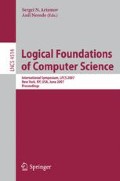Abstract
Deduction Modulo implements Poincarés principle by identifying deduction and computation as different paradigms and making their interaction possible. This leads to logical systems like the sequent calculus or natural deduction modulo. Even if deduction modulo is logically equivalent to first-order logic, proofs in such systems are quite different and dramatically simpler with one cost: cut elimination may not hold anymore. We prove first that it is even undecidable to know, given a congruence over propositions, if cuts can be eliminated in the sequent calculus modulo this congruence.
Second, to recover the cut admissibility, we show how computation rules can be added following the classical idea of completion a la Knuth and Bendix. Because in deduction modulo, rewriting acts on terms as well as on propositions, the objects are much more elaborated than for standard completion. Under appropriate hypothesis, we prove that the sequent calculus modulo is an instance of the powerful framework of abstract canonical systems and that therefore, cuts correspond to critical proofs that abstract completion allows us to eliminate.
In addition to an original and deep understanding of the interactions between deduction and computation and of the expressivity of abstract canonical systems, this provides a mechanical way to transform a sequent calculus modulo into an equivalent one admitting the cut rule, therefore extending in a significant way the applicability of mechanized proof search in deduction modulo.
Access this chapter
Tax calculation will be finalised at checkout
Purchases are for personal use only
Preview
Unable to display preview. Download preview PDF.
References
Aiguier, M., Boin, C., Longuet, D.: On generalized theorems for normalization of proofs. Technical report, LaMI - CNRS and Université d’Evry Val d’Essonne (2005)
Baader, F., Nipkow, T.: Term Rewriting and all That. Cambridge University Press, Cambridge (1998)
Barendregt, H., Barendsen, E.: Autarkic computations in formal proofs. Journal of Automated Reasoning 28, 321–336 (2002)
Bonacina, M.P., Dershowitz, N.: Abstract canonical inference. ACM Trans. Comput. Logic 8 (2007)
Bonichon, R.: TaMeD: A tableau method for deduction modulo. In: Basin, D., Rusinowitch, M. (eds.) IJCAR 2004. LNCS (LNAI), vol. 3097, pp. 445–459. Springer, Heidelberg (2004)
Burel, G., Kirchner, C.: Completion is an instance of abstract canonical system inference. In: Futatsugi, K., Jouannaud, J.-P., Meseguer, J. (eds.) Algebra, Meaning, and Computation. LNCS, vol. 4060, pp. 497–520. Springer, Heidelberg (2006)
Burel, G., Kirchner, C.: Cut elimination in deduction modulo by abstract completion (full version). Research report (2007), http://hal.inria.fr/inria-00132964
Crabbé, M.: Non-normalisation de la théorie de Zermelo. Manuscript (1974)
Dershowitz, N.: Orderings for term-rewriting systems. Theoretical Computer Science 17, 279–301 (1982)
Dershowitz, N.: Canonicity. In: Dahn, I., Vigneron, L. (eds.) FTP. Electronic Notes in Theoretical Computer Science, vol. 86, Elsevier, Amsterdam (2003)
Dershowitz, N., Kirchner, C.: Abstract saturation-based inference. In: LICS, pp. 65–74. IEEE Computer Society Press, Los Alamitos (2003)
Dershowitz, N., Kirchner, C.: Abstract Canonical Presentations. Theoretical Computer Science 357, 53–69 (2006)
Dowek, G.: What is a theory? In: Alt, H., Ferreira, A. (eds.) STACS 2002. LNCS, vol. 2285, pp. 50–64. Springer, Heidelberg (2002)
Dowek, G.: Confluence as a cut elimination property. In: Nieuwenhuis, R. (ed.) RTA 2003. LNCS, vol. 2706, pp. 2–13. Springer, Heidelberg (2003)
Dowek, G., Hardin, T., Kirchner, C.: HOL-λσ an intentional first-order expression of higher-order logic. Mathematical Structures in Computer Science 11, 1–25 (2001)
Dowek, G., Hardin, T., Kirchner, C.: Theorem proving modulo. Journal of Automated Reasoning 31, 33–72 (2003)
Dowek, G., Werner, B.: Proof normalization modulo. The Journal of Symbolic Logic 68, 1289–1316 (2003)
Dowek, G., Werner, B.: Arithmetic as a theory modulo. In: Giesl, J. (ed.) RTA 2005. LNCS, vol. 3467, pp. 423–437. Springer, Heidelberg (2005)
Gallier, J.H.: Logic for Computer Science: Foundations of Automatic Theorem Proving. Computer Science and Technology Series, vol. 5. Harper & Row, New York (1986), Revised On-Line Version (2003), http://www.cis.upenn.edu/~jean/gbooks/logic.html .
Gentzen, G.: Untersuchungen über das logische Schliessen. Mathematische Zeitschrift 39, 176–210, 405–431 (1934), Translated in Szabo (ed.) The Collected Papers of Gerhard Gentzen as “Investigations into Logical Deduction”
Hermant, O.: Méthodes Sémantiques en Déduction Modulo. PhD thesis, École Polytechnique (2005)
Hermant, O.: Semantic cut elimination in the intuitionistic sequent calculus. In: Urzyczyn, P. (ed.) TLCA 2005. LNCS, vol. 3461, pp. 221–233. Springer, Heidelberg (2005)
Knuth, D.E., Bendix, P.B.: Simple word problems in universal algebras. In: Leech, J. (ed.) Computational Problems in Abstract Algebra, pp. 263–297. Pergamon Press, Oxford (1970)
Peterson, G., Stickel, M.E.: Complete sets of reductions for some equational theories. Journal of the ACM 28, 233–264 (1981)
Author information
Authors and Affiliations
Editor information
Rights and permissions
Copyright information
© 2007 Springer Berlin Heidelberg
About this paper
Cite this paper
Burel, G., Kirchner, C. (2007). Cut Elimination in Deduction Modulo by Abstract Completion. In: Artemov, S.N., Nerode, A. (eds) Logical Foundations of Computer Science. LFCS 2007. Lecture Notes in Computer Science, vol 4514. Springer, Berlin, Heidelberg. https://doi.org/10.1007/978-3-540-72734-7_9
Download citation
DOI: https://doi.org/10.1007/978-3-540-72734-7_9
Publisher Name: Springer, Berlin, Heidelberg
Print ISBN: 978-3-540-72732-3
Online ISBN: 978-3-540-72734-7
eBook Packages: Computer ScienceComputer Science (R0)

